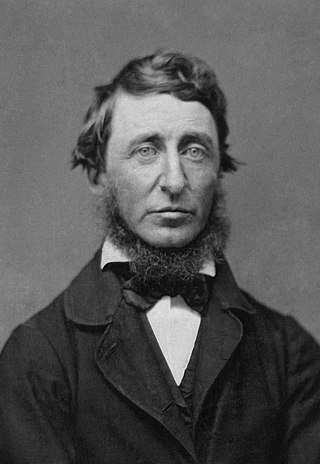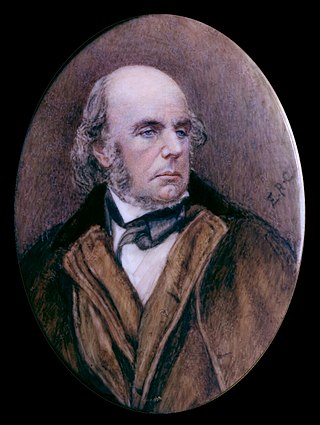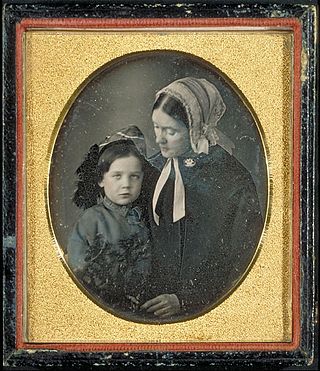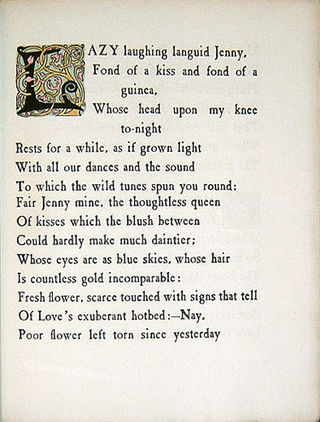
Rubáiyát of Omar Khayyám is the title that Edward FitzGerald gave to his 1859 translation from Persian to English of a selection of quatrains attributed to Omar Khayyam (1048–1131), dubbed "the Astronomer-Poet of Persia".

Ralph Waldo Emerson, who went by his middle name Waldo, was an American essayist, lecturer, philosopher, abolitionist, and poet who led the Transcendentalist movement of the mid-19th century. He was seen as a champion of individualism and critical thinking, as well as a prescient critic of the countervailing pressures of society and conformity. Friedrich Nietzsche thought he was "the most gifted of the Americans", and Walt Whitman called him his "master".

Henry David Thoreau was an American naturalist, essayist, poet, and philosopher. A leading transcendentalist, he is best known for his book Walden, a reflection upon simple living in natural surroundings, and his essay "Civil Disobedience", an argument in favor of citizen disobedience against an unjust state.
Transcendentalism is a philosophical, spiritual, and literary movement that developed in the late 1820s and 1830s in the New England region of the United States. A core belief is in the inherent goodness of people and nature, and while society and its institutions have corrupted the purity of the individual, people are at their best when truly "self-reliant" and independent. Transcendentalists saw divine experience inherent in the everyday, rather than believing in a distant heaven. Transcendentalists saw physical and spiritual phenomena as part of dynamic processes rather than discrete entities.

"Concord Hymn" is a poem by Ralph Waldo Emerson written for the 1837 dedication of an obelisk monument in Concord, Massachusetts, commemorating the battles of Lexington and Concord, a series of battles and skirmishes on April 19, 1775 which sparked the American Revolutionary War.

Frederic Henry Hedge was a New England Unitarian minister and Transcendentalist. He was a founder of the Transcendental Club, originally called Hedge's Club, and active in the development of Transcendentalism, although he distanced himself from the movement as it advanced.

The Old Manse is a historic manse in Concord, Massachusetts, United States, notable for its literary associations. It is open to the public as a nonprofit museum owned and operated by the Trustees of Reservations. The house is located on Monument Street, with the Concord River just behind it. The property neighbors the North Bridge, a part of Minute Man National Historical Park.
Richard Warrington Baldwin Lewis was an American literary scholar and critic. He gained a wider reputation when he won a 1976 Pulitzer Prize for Biography or Autobiography, the first National Book Critics Circle Award for nonfiction, and a Bancroft Prize for his biography of Edith Wharton. The New York Times called the book "a beautifully wrought, rounded portrait of the whole woman, including the part of her that remained in shade during her life" and said that the "expansive, elegant biography ... can stand as literature, if nothing else."

Samuel Worcester Rowse was an American illustrator, lithographer, and painter. He was most famous for his drawings of Ralph Waldo Emerson and Henry David Thoreau. Rowse is also well known for his lithograph, The Resurrection of Henry Box Brown at Philadelphia.
The influence of Persian literature in Western culture is historically significant. In order to avoid what E.G. Browne calls "an altogether inadequate judgment of the intellectual activity of that ingenious and talented people" (E.G.Browne, p4), many centers of academia throughout the world today from Berlin to Japan have permanent programs for Persian studies for the literary heritage of Persia.

The Night Thoreau Spent in Jail is a two-act American play by Robert E. Lee and Jerome Lawrence written in 1969. The play is based on the early life of the title character, Henry David Thoreau, leading up to his night spent in a jail in Concord, Massachusetts. Thoreau was jailed for refusing to pay a poll tax on the grounds that the money might be used to pay for the Mexican–American War, which he opposed.

The Ralph Waldo Emerson House is a house museum located at 18 Cambridge Turnpike, Concord, Massachusetts, and a National Historic Landmark for its associations with American philosopher Ralph Waldo Emerson. He and his family named the home Bush. The museum is open mid-April to mid-October; an admission fee is charged.

"The Rhodora, On Being Asked, Whence Is the Flower", or simply "The Rhodora", is an 1834 poem by American writer Ralph Waldo Emerson, a 19th century philosopher. The poem is about the rhodora, a common flowering shrub, and the beauty of this shrub in its natural setting.

Edward FitzGerald or Fitzgerald was an English poet and writer. His most famous poem is the first and best-known English translation of The Rubaiyat of Omar Khayyam, which has kept its reputation and popularity since the 1860s.
Laura Dassow Walls is an American professor of English literature and currently the William P. and Hazel B. White Professor of English at the University of Notre Dame.

James Elliot Cabot was an American philosopher and author, born in Boston to Samuel Cabot Jr., and Eliza Cabot.

Lidian Jackson Emerson was the second wife of American essayist, lecturer, poet and leader of the nineteenth century Transcendentalism movement, Ralph Waldo Emerson, and mother of his four children. An intellectual, she was involved in many social issues of her day, advocating for the abolition of slavery, the rights of women and of Native Americans and the welfare of animals, and campaigned for her famous husband to take a public stand on the causes in which she believed.
Raymond Emerson was an American civil engineer, investment banker, and faculty at the Peabody Museum of Archaeology and Ethnology. He is known for his large donations of personal Ralph Waldo Emerson letters and other documents for educational purposes. He was part of the Emerson family, and was Ralph Waldo Emerson's last surviving grandson. In addition to his marriage to Amelia Forbes, he was also connected to the Forbes family through other marriages in his parents' and his own generations.

Helen Van Vechten (1868–1949) was an American printer who became known for the hand-printed fine press books she produced for the Philosopher Press in Wisconsin around the turn of the 20th century. In her day, she was one of very few women involved in fine book-making in America and was regarded as a top expert in the field.
The Department of Philosophy at Harvard University is a philosophy department in Cambridge, Massachusetts, United States that is associated with the Harvard Faculty of Arts and Sciences. Housed at Emerson Hall, the department offers bachelor's, master's and doctorate degrees in philosophy. Both undergraduate and graduate students can complete programs with other Harvard departments. Students publish and edit The Harvard Review of Philosophy, an annual peer-reviewed journal on philosophy. The department consistently ranks among the top ten philosophical faculties in the United States and the world and specializes in a wide range of philosophical topics, including moral and political philosophy, aesthetics, metaphysics, analytical philosophy, history of philosophy, epistemology, philosophy of science and philosophy of language, mind, and logic.












